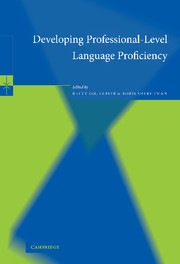Book contents
- Frontmatter
- Contents
- Notes on contributors
- Foreword
- Acknowledgments
- I Principles, practices, and theory
- II Programs
- 3 Contexts for advanced foreign language learning: a report on an immersion institute
- 4 Bridging the gap between language for general purposes and language for work: an intensive Superior-level language/skill course for teachers, translators, and interpreters
- 5 Learning Chinese in China: programs for developing Superior- to Distinguished-level Chinese language proficiency in China and Taiwan
- 6 Developing professional-level oral proficiency: the Shekhtman Method of Communicative teaching
- 7 The LangNet “Reading to the Four” Project: applied technology at higher levels of language learning
- 8 In the quest for the Level 4+ in Arabic: training Level 2–3 learners in independent reading
- 9 Teaching high-level writing skills in English at a Danish university
- 10 Heritage speakers as learners at the Superior level: differences and similarities between Spanish and Russian student populations
- 11 Teaching Russian language teachers in eight summer Institutes in Russian language and culture
- III Learners and users
- References
- Index
3 - Contexts for advanced foreign language learning: a report on an immersion institute
Published online by Cambridge University Press: 03 December 2009
- Frontmatter
- Contents
- Notes on contributors
- Foreword
- Acknowledgments
- I Principles, practices, and theory
- II Programs
- 3 Contexts for advanced foreign language learning: a report on an immersion institute
- 4 Bridging the gap between language for general purposes and language for work: an intensive Superior-level language/skill course for teachers, translators, and interpreters
- 5 Learning Chinese in China: programs for developing Superior- to Distinguished-level Chinese language proficiency in China and Taiwan
- 6 Developing professional-level oral proficiency: the Shekhtman Method of Communicative teaching
- 7 The LangNet “Reading to the Four” Project: applied technology at higher levels of language learning
- 8 In the quest for the Level 4+ in Arabic: training Level 2–3 learners in independent reading
- 9 Teaching high-level writing skills in English at a Danish university
- 10 Heritage speakers as learners at the Superior level: differences and similarities between Spanish and Russian student populations
- 11 Teaching Russian language teachers in eight summer Institutes in Russian language and culture
- III Learners and users
- References
- Index
Summary
Among the many consequences of the communicative turn in foreign language education (FLED) we must count the demand for high levels of teachers' second language (L2) abilities where instruction is characterized by interactive communication and extensive engagement with authentic texts in all modalities, rather than by the conveyance of rule-governed formal knowledge. Although professional-level L2 performance had been a tacit and firm assumption, that confidence received a serious blow when, in conjunction with the Proficiency Movement, many states encountered acute licencing and recertification difficulties because teachers were not assessed at the mandated level, usually “Advanced” according to the ACTFL Guidelines. Higher education, too, has encountered this gap between desired L2 abilities for its faculty and reality, though it relegates these matters to the privacy, if not to say, secrecy, of the hiring process rather than to official assessment (Koike and Liskin-Gasparro [1999]). Taken together, the uncomfortable admission of insufficient competence of L2 instructors at all educational levels with its obvious implications for classrooms and the field as a whole, not to mention the deep disappointment and, at times, anger of the teachers and faculty candidates themselves, have led professional organizations to make the issue a priority in future planning.
For obvious reasons, graduate foreign language departments play a pivotal role in crafting solutions due to their educational interests and their responsibilities toward their non-native graduate students.
- Type
- Chapter
- Information
- Developing Professional-Level Language Proficiency , pp. 61 - 76Publisher: Cambridge University PressPrint publication year: 2002
- 1
- Cited by



